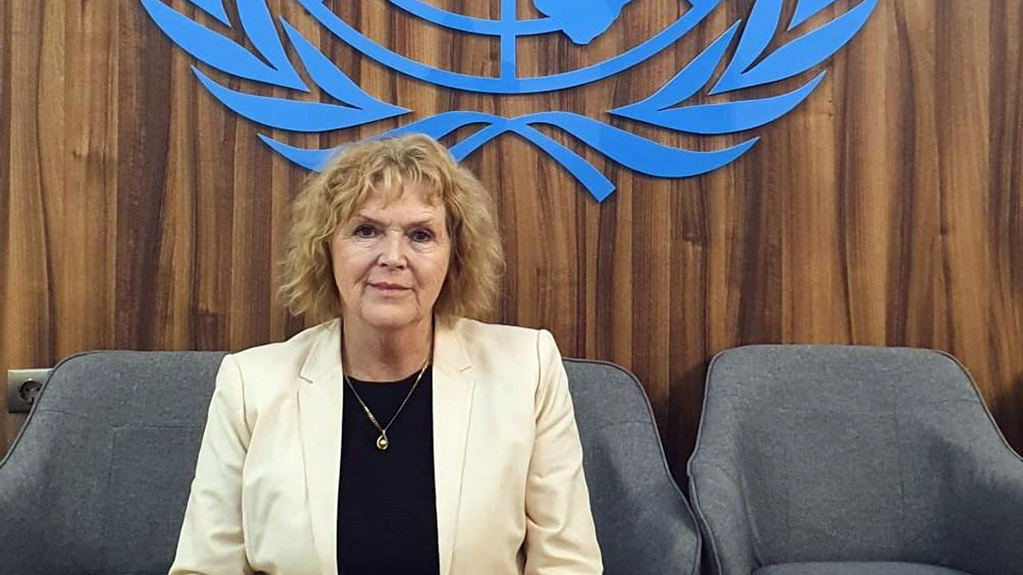‘‘Human rights defenders working in Georgia fear that their physical safety is at risk and that the state is actively trying to discredit their work and put them at risk - a fact that should be raising alarms for any government that claims that the protection of human rights, democracy and the rule of law are its priorities,’’ said Mary Lawlor, the UN special rapporteur on human rights issues, at a press conference. She summarized her eight-day visit to Georgia.
News
‘‘When I started my visit to Georgia, it was difficult for me to come to terms with the idea that the government of Georgia
is trying to disguise the systematic efforts undermining the human rights defenders and their most important activities by pretending to be open.
Impunity for attacks against journalists and other media workers who cover human rights issues is a significant and persistent problem. I consider these journalists and media representatives to be defenders of human rights. It is clear to me that these people are at high risk and that the state is not doing enough to ensure that they can do their duty without fear of reprisals.
The authorities also appear to be obstructing the work of journalists, as evidenced by reports of a very low response rate to requests for information, as well as a worrying code of conduct recently introduced by the Parliament, which is apparently meant as a punishing mechanism for journalists that bring discomfort to the government.
I will continue to monitor the situation of human rights defenders in Georgia and will cooperate with government officials until the final report is submitted to the Human Rights Council in March 2025. However, steps should be taken immediately to correct the deteriorating situation for human rights defenders,’’ the UN special rapporteur said, emphasizing that there is an obvious lack of political will to solve these problems, which, in turn, indicates that the state cannot fulfill its international obligations in the direction of human rights protection.
At the press conference, Mary Lawlor also touched on the so-called ‘‘coup case’’ and on the amendments introduced in the ‘‘law on assemblies and demonstrations’’ in an accelerated manner.
When I raised this sequence of events with the authorities, they referred me to the footage in question. I have reviewed this footage. In my view, there is nothing in the video that in any way substantiates the allegations made against the organizers and participants. Anyone could attend the 3-day training. The tape released as evidence of the conspiracy is 8 minutes long and clearly edited. At no point do the trainers who speak suggest or encourage violence. The presentation of the video as evidence of a conspiracy strongly indicates a deliberate attempt by the SSSG to criminalize the human rights defenders involved and delegitimize the exercise of fundamental rights, particularly young people and students exercising their right to peaceful protests, in the public eye.
By publishing a video recording of the training, the State Security Service clearly signaled to the human rights defenders organizing the training that they are under surveillance.
This fact further intensified the fear that arose in society in 2021, after it became known that the state had tapped many human rights defenders and independent journalists. Instead of responding appropriately to this fact, the government exacerbated the situation by approving the 2022 legislative amendments, which further expanded the state's powers of tapping and surveillance,’’ stated Mary Lawlor.
According to her, the amendments made to the law on Assemblies and Demonstrations are aimed at further limiting the right to peaceful protest. She called on the government to revoke the changes.
The first vice-speaker of the parliament, Gia Volski, called the critical report of the UN special rapporteur biased and shocking.
‘‘To say it mildly, the statement we heard from the representative of the United Nations was shocking with its irresponsibility and injustice. The UN never made statements on political issues. It seems that she is fulfilling some special task, I don't know under whose influence she acts and what caused her to make such a statement, but it can simply be summarized as a shocking injustice, mildly speaking. This was below the UN and they have no business meddling with Georgian politics. This was shocking with its unfairness, unprofessionalism, and nonalignment with the UN mandate,’’ stated Volski.















